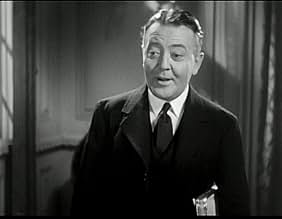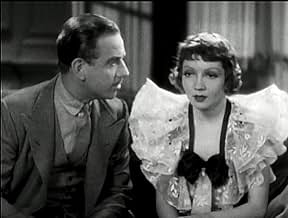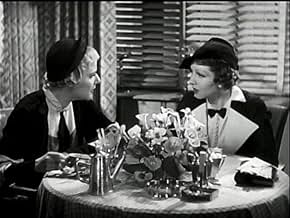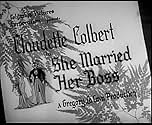Füge eine Handlung in deiner Sprache hinzuAn efficient secretary at a department store marries her boss, but discovers that taking care of him at home is a lot different to taking care of him at work.An efficient secretary at a department store marries her boss, but discovers that taking care of him at home is a lot different to taking care of him at work.An efficient secretary at a department store marries her boss, but discovers that taking care of him at home is a lot different to taking care of him at work.
- Regie
- Drehbuch
- Hauptbesetzung
- Auszeichnungen
- 1 wins total
Grace Hayle
- Agnes Mayo
- (as Grace Hale)
Ernie Adams
- Passerby
- (Nicht genannt)
William Arnold
- Department Head
- (Nicht genannt)
Lynton Brent
- Assistant Window Dresser
- (Nicht genannt)
Edmund Burns
- Newspaper Photographer
- (Nicht genannt)
A.S. 'Pop' Byron
- Store Watchman
- (Nicht genannt)
Empfohlene Bewertungen
Terribly uneven mix of comedy and romantic drama, the script of SHE MARRIED HER BOSS is unworthy of the talents assembled to interpret it. The always reliable Claudette Colbert has to contend with lines like: "Marriage is a woman's real career," as a woman secretly in love with her boss for six years. MELVYN DOUGLAS is the boss, but his part his so poorly written that you have to wonder what Colbert ever sees in him. Nevertheless, he plays it with a flair for this sort of inane comedy.
JEAN DIXON as Colbert's friend and KATHERINE Alexander as Douglas' snooty sister are just cardboard cutouts. And poor EDITH FELLOWS has to play the most insufferable brat since Bonita Granville's turn in THE CHILDREN'S HOUR.
There are various lapses of taste throughout (from today's viewpoint), and the costumes are really the most unflattering female designs ever worn by Colbert in any of her early films. You have to yearn for the Colbert of the '40s (so smartly sophisticated) because she looks downright dowdy in most of her odd wardrobe choices. As I say above, dated in more ways than one.
Not recommended.
JEAN DIXON as Colbert's friend and KATHERINE Alexander as Douglas' snooty sister are just cardboard cutouts. And poor EDITH FELLOWS has to play the most insufferable brat since Bonita Granville's turn in THE CHILDREN'S HOUR.
There are various lapses of taste throughout (from today's viewpoint), and the costumes are really the most unflattering female designs ever worn by Colbert in any of her early films. You have to yearn for the Colbert of the '40s (so smartly sophisticated) because she looks downright dowdy in most of her odd wardrobe choices. As I say above, dated in more ways than one.
Not recommended.
First, I must respectfully disagree with one reviewer here who kept describing the film as a screwball comedy. Even in the 1930s, every comedy was not a screwball comedy, and this isn't one (despite one kinda goofy car episode). It's not a drawing room comedy either. It's simply a domestic comedy...in fact, is it really a comedy. Let's see, you have an obsessive boss that has no real personal life, a sister that's a terrible prude and suppresses any family joy in life, a young daughter who is so unhappy that she's become a terrible brat, a young lady (Colbert)who has her eyes on her boss but then finds herself in an unsatisfying marriage, and a little girl who then pines because the stepmother who has brought some joy into her life then leaves home. In many ways, this is a pretty serious story -- with some comedic moments.
Several reviewers have wondered why the Colbert character is interested in the Melvyn Douglas boss character to begin with. A fair criticism. The screenwriters and director sure haven't given us much of a clue about that. But how many of us have found ourselves in an unfulfilling relationship or marriage, ultimately realizing we made a mistake. And I tried to remember that this film was made in 1935. Films were not always very sophisticated back then...they were slowly growing up...and the story here is certainly more sophisticated than many other films from the same time.
Claudette Colbert is quite good here, though obviously not quite as well developed as an actress as she was in the 1940s. Melvyn Douglas was good in the role he played, although it's rather hard to like that role. Two standout performances were 12-year-old Edith Fellows as Douglas' bratty daughter (who develops into a rather nice child once the home situation improves), and Raymond Walburn as Douglas' butler (the scenes of Douglas and Walburn in a drunken state were among the better drunk scenes I've seen).
If you see this movie for what it is -- a drama story with comedy overtones -- you'll really enjoy it. It's far better than many other mid-30s productions...and 1939 was just around the corner.
Several reviewers have wondered why the Colbert character is interested in the Melvyn Douglas boss character to begin with. A fair criticism. The screenwriters and director sure haven't given us much of a clue about that. But how many of us have found ourselves in an unfulfilling relationship or marriage, ultimately realizing we made a mistake. And I tried to remember that this film was made in 1935. Films were not always very sophisticated back then...they were slowly growing up...and the story here is certainly more sophisticated than many other films from the same time.
Claudette Colbert is quite good here, though obviously not quite as well developed as an actress as she was in the 1940s. Melvyn Douglas was good in the role he played, although it's rather hard to like that role. Two standout performances were 12-year-old Edith Fellows as Douglas' bratty daughter (who develops into a rather nice child once the home situation improves), and Raymond Walburn as Douglas' butler (the scenes of Douglas and Walburn in a drunken state were among the better drunk scenes I've seen).
If you see this movie for what it is -- a drama story with comedy overtones -- you'll really enjoy it. It's far better than many other mid-30s productions...and 1939 was just around the corner.
She Married Her Boss is one of those films where the title says it all, no need for any elaboration. Of course the bride is Claudette Colbert who's been crushing out on boss Melvyn Douglas for years.
But before she's a bride Claudette is a secretary and a most efficient one at that. She's got the business well organized, but Douglas's home is something of a shambles with spoiled brat of a daughter Edith Fellows ruling the roost and some crooked household help ripping him off.
So it's a business arrangement that Douglas has in mind when he marries Colbert. But he's slow on the uptake to realize that Colbert has romance in mind. Playboy Michael Bartlett is not slow however and he's got a nice singing voice to go with some oily charm.
Colbert and Douglas get some nice support from folks like Raymond Walburn as the new butler who gets tanked with Douglas, Katharine Alexander as Douglas's snooty sister and Jean Dixon doing the Eve Arden part before Eve Arden was around.
Gregory LaCava directed She Married Her Boss and we're certainly not seeing a director's cut. Harry Cohn's editors at Columbia Pictures butchered this one, the film ends rather abruptly though in truth you know where it all is going. And people who've had loved ones killed by drunk drivers won't find Raymond Walburn careening drunkenly through the streets behind the wheel all that funny.
Still the stars and the planets do shine in She Married Her Boss.
But before she's a bride Claudette is a secretary and a most efficient one at that. She's got the business well organized, but Douglas's home is something of a shambles with spoiled brat of a daughter Edith Fellows ruling the roost and some crooked household help ripping him off.
So it's a business arrangement that Douglas has in mind when he marries Colbert. But he's slow on the uptake to realize that Colbert has romance in mind. Playboy Michael Bartlett is not slow however and he's got a nice singing voice to go with some oily charm.
Colbert and Douglas get some nice support from folks like Raymond Walburn as the new butler who gets tanked with Douglas, Katharine Alexander as Douglas's snooty sister and Jean Dixon doing the Eve Arden part before Eve Arden was around.
Gregory LaCava directed She Married Her Boss and we're certainly not seeing a director's cut. Harry Cohn's editors at Columbia Pictures butchered this one, the film ends rather abruptly though in truth you know where it all is going. And people who've had loved ones killed by drunk drivers won't find Raymond Walburn careening drunkenly through the streets behind the wheel all that funny.
Still the stars and the planets do shine in She Married Her Boss.
Most modern viewers of 1930's comedies will be accustomed to the necessity of suspending disbelief and modern sensibilities to entirely enjoy these films. However, She Married Her Boss contains one or two scenes which make this a difficult task. The main problematic scene is the drunk driving scene which is sufficiently reckless as to be just plain alarming to modern audiences but fortunately occurs at the end of the movie so as not to be troubling throughout. The second such scene however is the (aural) scene of Julia (Claudette Colbert) spanking Anabelle several times with a hairbrush. In modern times, with the idea of physically punishing children being so controversial, this scene refuses to simply fade into the background of the film and become simply a comedic scene and lingers in a slight feeling of unease in watching the remainder of the film despite Annabelle's growing affection for Julia. Simliarly Julia's friends taunts of Annabelle appear somewhat cruel; being adults ganging up on an unhappy child, no matter how obnoxious her behaviour.
Although some of the comedic aspects of the film may not translate to a modern audience, the film nevertheless contains some gems of serious scenes - Claudette Colbert's reaction to her husband mocking her for behaving like a woman and his criticism that she is making their marriage "just like any other marriage". Similarly the shop dummy scene can be enjoyed on a number of levels, the drunken comedy is delightful but also wonderful is Colbert's pained expression and declaration that "Julia doesn't live here anymore". Finally my favourite scene of the film, when Melvyn Douglass confronts Colbert after her antics in the shop window appear in the press, effectively calling her "second hand goods". Colberts reactions from resignation, to pride to hurt to confrontation are a pure acting lesson.
While some of the comedy may struggle to appeal to modern audiences, the scene of the new bride (Colbert) being carried over the thresh-hold by her new husband's butler remains one of the funniest moments in 1930's comedy and Julia's kicking of the child shop dummy (surely a reaction to her troubled step-daughter) remains a guilty pleasure so that despite some reservations the film continues to work on both the dramatic and comedic levels despite some need to be prepared more than usual to put modern considerations aside to entirely enjoy this.
Although some of the comedic aspects of the film may not translate to a modern audience, the film nevertheless contains some gems of serious scenes - Claudette Colbert's reaction to her husband mocking her for behaving like a woman and his criticism that she is making their marriage "just like any other marriage". Similarly the shop dummy scene can be enjoyed on a number of levels, the drunken comedy is delightful but also wonderful is Colbert's pained expression and declaration that "Julia doesn't live here anymore". Finally my favourite scene of the film, when Melvyn Douglass confronts Colbert after her antics in the shop window appear in the press, effectively calling her "second hand goods". Colberts reactions from resignation, to pride to hurt to confrontation are a pure acting lesson.
While some of the comedy may struggle to appeal to modern audiences, the scene of the new bride (Colbert) being carried over the thresh-hold by her new husband's butler remains one of the funniest moments in 1930's comedy and Julia's kicking of the child shop dummy (surely a reaction to her troubled step-daughter) remains a guilty pleasure so that despite some reservations the film continues to work on both the dramatic and comedic levels despite some need to be prepared more than usual to put modern considerations aside to entirely enjoy this.
I've read the other comments that talked about aspects of this film that are dated, offensive, or just plain bizarre. I was rather surprised that no one brought up the movie's cringe-inducing gender stereotypes. Anyone who has seen Claudette Colbert or Melvyn Douglas in the films they made before the introduction of the Production Code(in mid-1934) would immediately recognize the heavy hand of the censors, who did their best to impose on Hollywood their narrow-minded idea of "family values." (On the basis of this film, it would appear that allowing married women to pursue a career would bring about the end of American society, but child abuse and drunk driving are just good clean fun!) Though the cast and plot look good on paper, the result is strained and uneven, as if the script had been written to Pre-Code standards and then hastily cleaned up so as not to offend the censors.
Claudette Colbert plays Julia Scott, a bright, capable, and confident executive assistant at a large department store. She runs the busy office like a well-oiled machine and clearly enjoys the work. It's hard to fathom why she's spent six years mooning over her boss, Richard Barclay. The way the role of Barclay is written, the usually charming Melvyn Douglas comes off as a humorless, sexless cipher. All the more jarring, then, to hear Julia talk about her desire to give up her terrific job and marry Barclay. Without a trace of irony, she describes marriage as "a woman's REAL career."
Okay, she wants to get married. But why on earth would the lovely and vivacious Julia want Barclay as a husband? Not only is he dull as ditch-water, he treats her as if she were a piece of super-efficient office equipment. Once they're married, he ridicules her for assuming the stereotypical role of housewife, despite the fact that she's set his chaotic home in order and tamed his obnoxious brat of a daughter. There's nothing in the movie to explain Barclay's eventual change of heart; apparently it's brought on by a quart of whiskey. So much for good old "family values." The film is so devoid of any hint of sexual attraction that we don't see a single cuddle or smooch--not even at the very end when it's clear that the newlyweds will finally get around to doing what newlyweds are famous for doing. Julia has more physical contact (and chemistry) with Leonard Rogers, her sweet-tempered playboy suitor, who's a lot more appealing as husband material than that cold fish Barclay.
Solid performances are turned in by familiar actors in some of the secondary roles: Raymond Walburn as the perfect butler; Katherine Alexander as Barclay's drama-queen sister; Edith Fellows as the evil daughter; and especially Jean Dixon as Julia's wise-cracking, matchmaking best friend.
Would love to have seen this film made just a year earlier, before the Hays Office started taking their moralizing hatchet to so many of the things that made movies of the 30s worth watching.
Claudette Colbert plays Julia Scott, a bright, capable, and confident executive assistant at a large department store. She runs the busy office like a well-oiled machine and clearly enjoys the work. It's hard to fathom why she's spent six years mooning over her boss, Richard Barclay. The way the role of Barclay is written, the usually charming Melvyn Douglas comes off as a humorless, sexless cipher. All the more jarring, then, to hear Julia talk about her desire to give up her terrific job and marry Barclay. Without a trace of irony, she describes marriage as "a woman's REAL career."
Okay, she wants to get married. But why on earth would the lovely and vivacious Julia want Barclay as a husband? Not only is he dull as ditch-water, he treats her as if she were a piece of super-efficient office equipment. Once they're married, he ridicules her for assuming the stereotypical role of housewife, despite the fact that she's set his chaotic home in order and tamed his obnoxious brat of a daughter. There's nothing in the movie to explain Barclay's eventual change of heart; apparently it's brought on by a quart of whiskey. So much for good old "family values." The film is so devoid of any hint of sexual attraction that we don't see a single cuddle or smooch--not even at the very end when it's clear that the newlyweds will finally get around to doing what newlyweds are famous for doing. Julia has more physical contact (and chemistry) with Leonard Rogers, her sweet-tempered playboy suitor, who's a lot more appealing as husband material than that cold fish Barclay.
Solid performances are turned in by familiar actors in some of the secondary roles: Raymond Walburn as the perfect butler; Katherine Alexander as Barclay's drama-queen sister; Edith Fellows as the evil daughter; and especially Jean Dixon as Julia's wise-cracking, matchmaking best friend.
Would love to have seen this film made just a year earlier, before the Hays Office started taking their moralizing hatchet to so many of the things that made movies of the 30s worth watching.
Wusstest du schon
- WissenswertesThe beginning theme music is the same as the 1934 movie It Happened One Night.
- Zitate
Julia Scott: This is Grandma Scott. She knitted the Dred Scott decision on a piece of old burlap.
Top-Auswahl
Melde dich zum Bewerten an und greife auf die Watchlist für personalisierte Empfehlungen zu.
Details
- Laufzeit
- 1 Std. 25 Min.(85 min)
- Farbe
- Seitenverhältnis
- 1.37 : 1
Zu dieser Seite beitragen
Bearbeitung vorschlagen oder fehlenden Inhalt hinzufügen



































